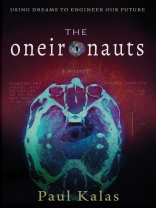Have you ever had a strong feeling of deja vu or witnessed that a dream came true in the future? Are such experiences precognitive or just illusions of the mind? How would a top scientist approach such questions about the paranormal?
The Oneironauts, or ‘the dream travelers, ‘ introduces new scientific evidence that we really do experience possible future events in our dreams.
Author Paul Kalas is the University of California, Berkeley astronomer who captured the first picture of a planet orbiting the nearby star Fomalhaut using the Hubble Space Telescope. This image appeared on the front page of the New York Times and is displayed in the National Air and Space Museum.
In The Oneironauts he reveals for the first time that this pioneering discovery was recorded in his dream diary nine years before it was actually discovered.
In Chapters 1-3, Dr. Kalas relates how prophetic dreams allowed him to both avoid an unpleasant event and affirm a desired goal. He concludes that fate is an illusion, the future can be changed, and both our gut instincts and sense of hope arise from precognitive dreams.
Chapters 4 presents the famous astronomical discovery and precognitive dream in detail, while Chapter 5 analyzes a total of 332 precognitive experiences. Dr. Kalas interprets precognition as a phenomenon related to memory and learning that also influences our personal identity and life path.
Dr. Kalas reviews modern concepts of space and time in Chapters 6 and 7. From physics and astronomy he introduces the reader to relativity, gravitational lensing, the particle-wave duality of light, quantum entanglement, and biophysics. From neuroscience he explains key breakthroughs in our understanding of memory and the perception of spacetime through the study of the hippocampus, sleep and theta rhythm.
In Chapter 8, Dr. Kalas engages the reader with his vision of how precognitive dreaming can improve the lives of individuals and ultimately the future of humanity. What will our society look like in 1, 000 years when humans and artificial intelligence have developed reliable methods to recover information from the future?
The Oneironauts will dazzle anyone who has had a precognitive experience or simply wishes to read what a leading scientist predicts about the future. It is beautifully illustrated with 34 original figures and clearly explains modern scientific topics with a touch of humor and references to over 100 writers, poets, artists and scholars.
Зміст
Preface: The Socratic Gamble
1. Twin Towers Falling
2. Destiny, Hope and the Trifid Nebula
Trifid Poster Falling
The Paradox of Many Universes and Precognition
The Janus in Us
3. The Heidelberg Dome
The Irrational Path to a Bargain Universe
Expanding the Physical Basis of Instinct and Intuition
Predetermined Destiny vs. Hyperactive Free Will
4. Fomalhaut
Fomal…. what?
Road to Discovery
Dreaming the Discovery
House of Cards?
Is it Jesus Toast?
Fomalhaut vs. the Twin Towers
Is it Science?
The Janusian Mind: Two Times Meeting in One Brain
Fate Revisited—The Question of Self
Experiencing Many Worlds
Pseudodivine Knowledge—What’s at Stake?
5. Dissect the Oneironaut!
The Medical Interview
Release the Oneironaut
Dissect the Déjà Vu
Summary
6. The Physics of Time Using Nature’s Swiss Army Knife
The Big Knife: Speed of Light
The Magnifying Glass: Warps in Spacetime
The Screwdriver and the Corkscrew: Particle and Wave
The Swiss Cross: Entanglement
The Little Scissors: Light Influences Biology
7. Hippocampus
The Gatekeeper
Spacetime in the Mind
The Gatekeeper’s Tango
Janus, the Glitch
Ratman’s Angels
8. The Oneironauts
The Dreamnet
The Oneironauts of Today
IAPO—The Oneironauts of Tomorrow
The Local Oneironauts
Research, Education and Funding for the Oneironauts
The Global Oneironauts
The Machine Oneironauts
Law and Ethics: The LEO Branch
Synthetic God
What Dreams May Come
Appendix I: Characters in The Oneironauts
Appendix II: Glossary
Appendix III: Captions for Chapter Heading Images
Appendix IV: Videos
“How luggage is lost”
About the Author
NOTES
INDEX
Про автора
PAUL KALAS is an astronomer who searches for planetary systems around other stars using the most advanced telescopes in existence. He is an astronomy faculty member at the University of California, Berkeley, a research scientist at SETI Institute and an elected Fellow of the American Association for the Advancement of Science. His research career includes the publication of four breakthrough papers as first author in the leading scientific journals Nature and Science. In 2008 he announced the first optical image of an extrasolar planet orbiting the nearby star Fomalhaut using the Hubble Space Telescope, for which he was awarded the Newcomb Cleveland Prize in 2009.












